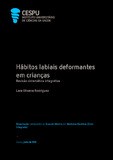| dc.contributor.advisor | PINTO, RUI MANUEL SIMÕES | |
| dc.contributor.author | Oliveira Rodriguez, Lara | |
| dc.date.accessioned | 2023-11-24T14:11:53Z | |
| dc.date.available | 2023-11-24T14:11:53Z | |
| dc.date.issued | 2023 | |
| dc.identifier.uri | http://hdl.handle.net/20.500.11816/4479 | |
| dc.description.abstract | Introdução: Os hábitos orais deformantes são responsáveis por muitas maloclusões dentárias, sendo considerados um dos principais problemas de saúde oral. Esses hábitos incluem a sucção e mordida dos lábios, que pode afetar negativamente o desenvolvimento da mandíbula e maxila, além da fala e desenvolvimento psicológico da criança. A eliminação desses hábitos é difícil, mas é fundamental para evitar problemas de saúde oral no futuro.
Objetivos: Conhecer os efeitos que pode apresentar uma criança com o hábito de morder, lamber ou succionar o lábio durante o seu desenvolvimento, analisar quais são os diferentes tipos de tratamento e determinar qual é o melhor.
Materiais e Métodos: Foi realizada uma pesquisa bibliográfica nas bases de dados PubMed e Scielo, usando a combinação das seguintes palavras-chaves: “lower lip sucking habit”, “lip sucking”, “lip biting”, “deleterious habit”.
Resultados: Foram selecionados os artigos escritos em português, español e inglês; de um total de 257 artigos, foram utilizados 18 que obedeciam os critérios de inclusão definidos.
Discusão: O hábito de sucção labial prolongada pode criar obstáculos mecânicos para a erupção dos dentes anteriores, levando a uma mordida aberta e má oclusão. Além disso, pode causar distúrbios musculares e da articulação temporomandibular (ATM), alterações na respiração, postura e mímica facial, bem como afetar os tecidos moles da boca.
Conclusão: Existem diferentes tipos de tratamento para crianças com este hábito que são rápidos e eficazes mas, o diagnóstico precoce e a educação sobre prevenção e tratamento é essencial. | pt_PT |
| dc.description.abstract | Introduction: Deforming oral habits are responsible for many dental malocclusions, being considered one of the main oral health problems. These habits include lip-sucking and biting, which can negatively affect the development of the mandible and maxilla, as well as the child's speech and psychological development. Eliminating these habits is difficult, but it is essential to avoid oral health problems in the future.
Objectives: To know the effects that a child with a habit of biting, licking, or sucking the lip may have during its development, to analyze what the different types of treatment are, and to determine which is best.
Materials and Methods: A bibliographic search was carried out in the PubMed and Scielo databases, using the combination of the following keywords: "lower lip sucking habit", "lip sucking", "lip biting", "deleterious habit".
Results: Articles written in Portuguese, Spanish and English were selected; from a total of 257 articles, 18 that met the defined inclusion criteria were used.
Discussion: Prolonged lip-sucking habit can create mechanical obstacles to the eruption of the anterior teeth, leading to an open bite and malocclusion. Moreover, it can cause muscle and temporomandibular joint (TMJ) disorders, changes in breathing, posture and facial mimicry, as well as affect the soft tissues of the mouth.
Conclusion: There are different types of treatment for children with this habit which are fast and effective but, early diagnosis and education about prevention and treatment is essential. | pt_PT |
| dc.language.iso | por | pt_PT |
| dc.rights | info:eu-repo/semantics/openAccess | pt_PT |
| dc.subject | Lower lip sucking habit | pt_PT |
| dc.subject | Lip sucking | pt_PT |
| dc.subject | Lip biting | pt_PT |
| dc.subject | Deleterious habit | pt_PT |
| dc.title | Hábitos labiais deformantes em crianças Revisão sistemática integrativa | pt_PT |
| dc.type | info:eu-repo/semantics/masterThesis | pt_PT |
| dc.identifier.tid | 203358295 | pt_PT |
| thesis.degree.name | Mestrado em Medicina Dentária | pt_PT |

